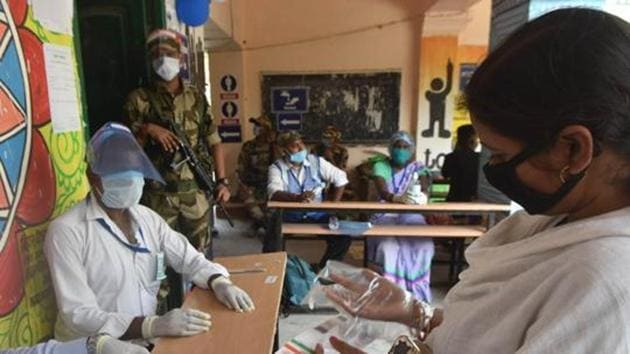Wages, caste and family pride in play at Jehanabad
The three seats -- Jehanabad, Ghosi and Makhdumpur (reserved for scheduled castes) – have influential leaders from both the National Democratic Alliance (NDA) and the Opposition Grand Alliance.
Discontent over government school teacher recruitment policies, caste dynamics and family prestige are shaping the political campaign in the three assembly segments in southern Bihar’s Jehanabad district that go to the polls in the first phase of the assembly elections on Wednesday.

The three seats -- Jehanabad, Ghosi and Makhdumpur (reserved for scheduled castes) – have influential leaders from both the National Democratic Alliance (NDA) and the Opposition Grand Alliance. In 2010, the Janata Dal (United) – which is part of the NDA – won all three seats and in 2015, the Rashtriya Janata Dal (RJD) won two, and the JD(U) – which was part of the GA – secured one seat.
This time, the fiercest battle is being waged for the Jehanabad seat, where education minister and JD(U) candidate Krishnandan Prasad Verma is facing off with Kumar Krishna Mohan, alias Suday Yadav of the RJD and Indu Devi Kashyap of the Lok Janshakti Party. Kashyap switched to LJP when the BJP denied her a ticket.

A key local campaign issue is the demand to raise the salaries of roughly 350,000 government school teachers appointed since 2006 through panchayats and city municipalities. Teachers recruited through this special scheme want their salaries brought at par with state government teachers. The former are on contract while the latter are permanent.
“Verma has held the post of education minister, but he has done little for the teachers. In 2019, vacancy for primary teachers was announced but yet things are to be finalised, besides the condition of education has deteriorated under his regime,” said Rahul Kumar of Kinjar, who is seeking job in a government school.
Verma denies this. “The government has given hike to the teachers and they are no more working on contract, as EPF [employee provident fund] contribution has also been started for them,” he said. He also pointed to the announcement of 15% hike in salaries and benefits for these teachers made in September.
A second issue is caste. Yadav is the son of Mundrika Singh Yadav, who won the seat in 2015 on a RJD ticket but died in 2017.
Yadavs, along with Bhumihars and Rajputs, are dominant in the area. Verma, who won the 2015 election from neighbouring Ghosi, hails from the numerically smaller Kushwaha caste.
“Suday could dent prospects of Verma…he commands votes of Yadavs, a dominant caste in the district. Besides, Kashyap could also cut some share of votes that NDA commands,” said Md Intekhab Alam, a professor at the SN Sinha College, Jehanabad. “Ultimately, it will boil down to caste equation,” he added.
Jehanabad shot into infamy in the late 1990s when the upper-caste militia of Ranvir Sena committed large-scale violence on the Dalit communities, including the 1997 Laxmanpur Bathe massacre where 57 villagers were killed in one night.
Bhumihars, who controlled the Ranvir Sena, continue to be dominant and local residents say caste pride may shape their electoral choice.
The fight in Ghosi assembly segment is between Rahul Kumar, who lost to Verma in 2015 before joining the JD(U), and Ram Bali Singh Yadav of the Communist Party of India (Marxist Leninist), which is a constituent in the Opposition Grand Alliance.
Kumar, who hails from the Bhumihar caste, is the son of Jagdish Sharma, who won the seat three times and is currently out on bail in cases of AH Scam.
Kumar won the assembly election in 2010 on a JD(U) ticket but in 2015, he lost on a Hindustani Awami Morcha (Secular) ticket because he couldn’t secure the support of backward castes, Dalits and minorities. HAM-S is a part of the NDA.
“Jagdish Sharma, out on bail, has been working hard to retain his fortress of Ghosi and this seat is a prestige issue for him,” said Lakhan Deo, a local resident.
In Makhdumpur, HAM-S president Jitan Ram Manjhi is stumping hard for his son-in-law Devendra Kumar, who is an engineer by profession. He is fighting against Satish Kumar of the RJD.
The former chief minister has considerable hold over the reserved constituency but he lost the 2015 elections to RJD’s Subedar Das in an election where Dalits and backward castes united behind the Grand Alliance. He, however, won from Imamganj seat, where he is also a candidate this time.
“Manjhi has been former chief minister of Bihar, so, for the development of Makhdumpur, he will have a say in the government. But Devendra Kumar is a new candidate and had not been politically active in the area,” said Sipu Bhuiya, a resident of Makhdumpur Bazaar.






